Free Online Productivity Tools
i2Speak
i2Symbol
i2OCR
iTex2Img
iWeb2Print
iWeb2Shot
i2Type
iPdf2Split
iPdf2Merge
i2Bopomofo
i2Arabic
i2Style
i2Image
i2PDF
iLatex2Rtf
Sci2ools
108
click to vote
TKDE
2008
2008
Kernel Uncorrelated and Regularized Discriminant Analysis: A Theoretical and Computational Study
Linear and kernel discriminant analyses are popular approaches for supervised dimensionality reduction. Uncorrelated and regularized discriminant analyses have been proposed to overcome the singularity problem encountered by classical discriminant analysis. In this paper, we study the properties of kernel uncorrelated and regularized discriminant analyses, called KUDA and KRDA, respectively. In particular, we show that under a mild condition, both linear and kernel uncorrelated discriminant analysis project samples in the same class to a common vector in the dimensionality-reduced space. This implies that uncorrelated discriminant analysis may suffer from the overfitting problem if there are a large number of samples in each class. We show that as the regularization parameter in KRDA tends to zero, KRDA approaches KUDA. This shows that KUDA is a special case of KRDA and that regularization can be applied to overcome the overfitting problem in uncorrelated discriminant analysis. As the ...
| Added | 15 Dec 2010 |
| Updated | 15 Dec 2010 |
| Type | Journal |
| Year | 2008 |
| Where | TKDE |
| Authors | Shuiwang Ji, Jieping Ye |
Comments (0)

